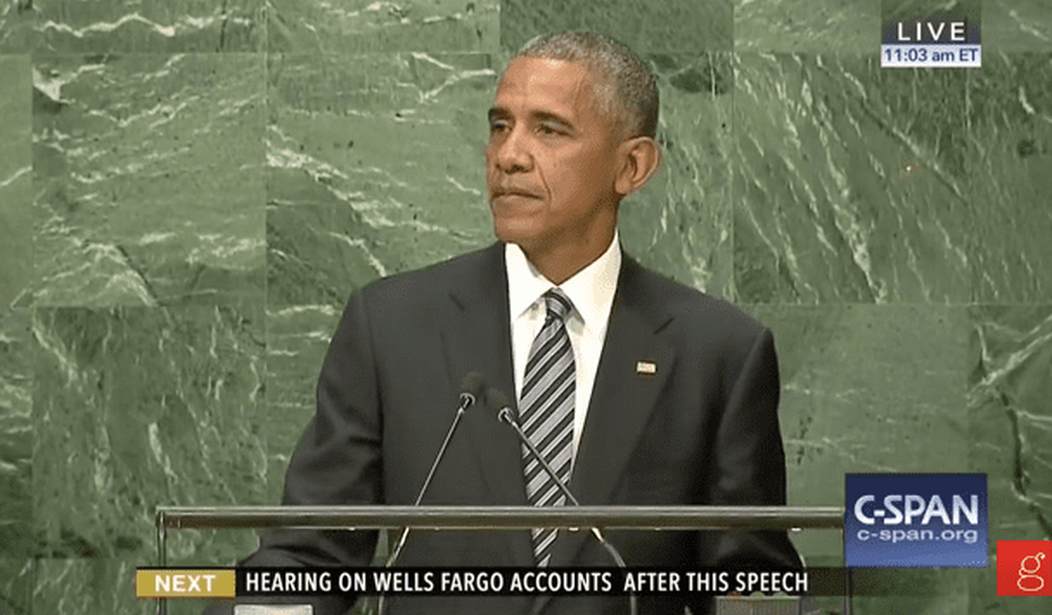Do you know the difference between a supremacist grievance and an egalitarian grievance? This is the key to understanding the widely held claim that Muslim grievances are the source of Muslim violence.
Take the latest Muslim attack on U.S. soil. Last week, Abdul Razak Ali Artan — an 18-year-old Muslim refugee from Somalia, who was receiving aid from Catholic charities — rammed his car into a building at The Ohio State University. He then got out and stabbed people with a butcher knife. He was eventually shot and killed by a guard; 13 people were hospitalized.
Why did he do it?
According to the “experts,” Artan — like so many other violent Muslim refugees before him — had grievances. CNN, NBC, the Washington Post, and many others cited a Facebook post by Artan:
I am sick and tired of seeing my fellow Muslim Brothers and Sisters being killed and tortured EVERYWHERE.
Yet despite this claim of ubiquity, he only cited one nation:
Seeing my fellow Muslims being tortured, raped and killed in Burma led to a boiling point. I can’t take it anymore.
The question before us is simple: Was Artan provoked to go on a murderous rampage in America because of grievances concerning the treatment of Muslims in Burma?
For about a decade now, I’ve argued that the “Muslim grievance” narrative is a myth meant to shield Islamic teachings from scrutiny. The “Muslim grievance” narrative goes like this: if Islam is a religion of peace yet Muslims everywhere are behaving violently, then the explanation we must all cling to is that they are really, really pissed off about something being done to them.
Most recently, the Islamic State, instead of disseminating and taking advantage of the “grievance” claim, could not have been clearer as they told the West the truth: no matter what the West does, the true reason ISIS hates and terrorizes us is because we are infidels.
Millions of Muslims — including Artan — do harbor strong grievances against the West and others. The problem is that they define “grievance” in a manner incompatible with liberty.
When most Westerners think of the word “grievance,” they think in egalitarian terms: X has a grievance against Y because Y doesn’t treat X with equality. For example, your boss or your teacher treats you worse — without equality — than other employees or other students. You then have a grievance which most in the West would say is legitimate: because the people of the West were raised on the unique idea of treating others as they would be treated.
This is not the sort of grievance that animates many Muslims – and certainly not those who resort to terrorism.
Rather, they are animated by a supremacist-based grievance: they get angry seeing infidels on an equal footing with Muslims. And they get murderous seeing infidels actually lording over Muslims.
Islamic doctrine, which persuades Muslims into believing they are superior to non-Muslims — to the degree that they are dogs and cattle — imbues Muslims with this sense of entitlement.
For example, in Pakistan, as Christian children were singing carols inside a church, Muslim men from a nearby mosque barged into the church with an axe, destroyed the furniture and altar, and beat the children. “You are disturbing our prayers. … How dare you use the mike and speakers?” explained the enraged Muslims. When a Muslim slapped a Christian and the latter reciprocated, the Muslim exclaimed: “How dare a Christian slap me!” Anti-Christian violence immediately ensued.
Islamic grievances are based on what I call Islam’s “How Dare You?” phenomenon. Remember it the next time media, politicians, and other talking heads tell you that Muslim mayhem and outbursts of violence are products of grievances. Missing from their rationale is the supremacist basis of these grievances.
Consider the Conditions of Omar, a foundational medieval Muslim text dealing with how “infidels” living under Muslim authority must behave, attributed to the second caliph and close friend of Muhammad, Omar.
Among other stipulations, it commands conquered Christians not to raise their “voices during prayer or readings in churches anywhere near Muslims” (hence the axe attack in Pakistan). It also commands them not to display any signs of Christianity — specifically listing Bibles and crosses — and not to build churches.
(See Crucified Again: Exposing Islam’s New War on Christians, for my translation of “The Conditions of Omar.”)
If the supremacist nature of Islamic law is still not clear enough, the Conditions literally commands Christians to give up their seats to Muslims as a show of respect. By way of analogy, consider when Rosa Parks, a black woman, refused to give up her bus seat to white passengers. Any white supremacist at the time had sincere grievances: how dare she think herself equal?
But were such grievances legitimate? Should they have been accommodated? Similarly, are the endless supremacist-based “grievances” of Muslims legitimate and should they be accommodated?
These are the questions missing from the debate about easily bruised Muslim sensitivities.
One can go on and on with examples from all around the Islamic world:
— In Turkey, a Bible publishing house was stormed and three of its Christian employees tortured, disemboweled, and finally murdered. One suspect later said: “We didn’t do this for ourselves, but for our religion [Islam] … Our religion is being destroyed.”
— In Egypt, after a 17-year-old Christian student refused to obey his Muslim teacher’s orders to cover up his cross, the teacher and some Muslim students attacked, beat, and ultimately murdered the youth.
— These Turkish and Egyptian Muslims were truly aggrieved: As seen, Islam’s Conditions makes clear that Christians must not “produce a cross or Bible” around Muslims. How dare the Egyptian student and Turkish Bible publishers refuse to comply — thus grieving Muslims into murdering them?
— In parts of Indonesia, because it is becoming next to impossible for Christians to build churches, they often congregate outside to celebrate Christmas — only to be attacked by Muslims hurling cow dung and bags of urine at the Christians as they pray.
— In Egypt, the mere rumor that Christians are trying to build, or even renovate, an existing church sets off mass riots and attacks on Christians. The Muslims of Indonesia and Egypt are also sincerely aggrieved: how dare these Christians think they can build or renovate a church when the Conditions forbid it?
In short, anytime non-Muslims dare to overstep their Sharia-designated “inferior” status, supremacist Muslims become violently aggrieved.
From here, one can begin to understand the ultimate Muslim grievance: Israel.
For if “infidel” Christian minorities are deemed inferior and attacked by aggrieved Muslims for exercising their basic human rights, like freedom of worship, how must Muslims feel about Jews — the descendants of pigs and apes, according to the Koran — exercising power and authority over fellow Muslims in what is perceived to be Muslim land?
How dare they?!
Of course, if grievances against Israel were really about universal justice and displaced Palestinians, Muslims would be aggrieved at the fact that millions of Christians are currently being displaced in the name of jihad.
Needless to say, they are not.
Which brings us back to Artan’s “grievances.” Recall his Facebook lament:
I am sick and tired of seeing my fellow Muslim Brothers and Sisters being killed and tortured EVERYWHERE. Seeing my fellow Muslims being tortured, raped and killed in Burma led to a boiling point. I can’t take it anymore.
Note, he is aggrieved because his “Muslim Brothers and Sisters” are being abused. Key word: Muslim. He didn’t care about universal justice.
Otherwise, he would have been expressing his anger at the brutal persecution experienced by a tiny minority in his own home country of Somalia. There, any Somali discovered practicing Christianity is ruthlessly persecuted and sometimes butchered, especially by the popular Islamic organization Al-Shabaab — “The Youth.”
Somali Christians share the same looks, nationality, ethnicity, language, and culture as Artan. They are literally his true “brothers.” Yet their unjust persecution didn’t matter to him; his sympathies belonged instead with a people in distant Burma who have nothing in common with him other than being Muslim.
And it was that fact — that “subhuman infidels” dared to mistreat “superior Muslims” — that so irked the young Somali. Hence why he concluded his Facebook rant with the following sentence — often omitted by the same media that cited his post as evidence of “grievances”:
By Allah, I am willing to kill a billion infidels in retribution for a single disabled Muslim/Musliman.
Incidentally, like Muslim minorities in other nations, Muslims in Burma have long antagonized their Buddhist hosts — through the usual Muslim-on-infidel attacks, murders, rapes, temple burnings, etc. — and their current unenviable lot is in great part due to this fact.
In the words of Wirathu, the leading anti-Muslim Buddhist monk in Burma: “If we are weak, our land will become Muslim.” The theme song of his party speaks of people who “live in our land, drink our water, and are ungrateful to us,” a reference to Muslims. And that “we will build a fence with our bones if necessary” to keep them out. His pamphlets say “Myanmar [Burma] is currently facing a most dangerous and fearful poison that is severe enough to eradicate all civilization.”
In short, the next time you hear that Muslim rage and terrorism are products of grievances — from cartoons to territorial disputes to the treatment of Muslims in distant nations — remember that this is absolutely true. But these “grievances” are not predicated on any rational standards of equality or justice, but on a supremacist worldview.










Join the conversation as a VIP Member